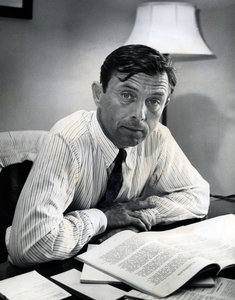Reed Whittemore facts for kids
Quick facts for kids
Reed Whittemore
|
|
|---|---|
 |
|
| Born | Edward Reed Whittemore, Jr. September 11, 1919 New Haven, Connecticut, USA |
| Died | April 6, 2012 (aged 92) |
| Occupation | Poet |
| Nationality | American |
| Alma mater | Yale University |
Edward Reed Whittemore, Jr. (born September 11, 1919 – died April 6, 2012) was an American poet, writer, and college professor. He was known for his clever and often funny poems. He was even chosen twice to be the official "Poet Laureate" for the Library of Congress. This is a special honor given to a poet who represents the country.
Contents
About Reed Whittemore
Early Life and Education
Reed Whittemore was born in New Haven, Connecticut, in 1919. He went to Phillips Academy and then studied at Yale University. He earned his degree from Yale in 1941.
Starting a Magazine
While he was a student at Yale, Reed and his roommate, James Angleton, started a literary magazine. They called it Furioso. This magazine became very famous for its time. It published poems by many well-known writers, including Ezra Pound and William Carlos Williams. These small, independent magazines were important for sharing new writing. Furioso was published on and off until 1953.
Teaching and Writing Career
After serving in the Army, Reed Whittemore published his first book of poems in 1946. From 1947 to 1966, he was a professor of English at Carleton College. While teaching there, he started his magazine again, but this time he called it the Carleton Miscellany. He helped many new poets get their start, like Charles Wright. Later, he taught at the University of Maryland College Park until 1984.
Poet Laureate Honors
Reed Whittemore was recognized as a very important poet. He became the Poet Laureate of Maryland. He also served twice as the Poet Laureate Consultant in Poetry for the Library of Congress. This means he was a special advisor on poetry for the United States.
His Unique Poetry Style
Reed Whittemore's poems were famous for their smart and often funny style. He liked to use humor to make his points. Another poet, X.J. Kennedy, said that Reed's whole career was a "brave protest against dullness." This means he always tried to make his writing interesting and fresh.
His book, The Mother's Breast and the Father's House, was a finalist for the National Book Award for poetry. This is a very big award for writers. He also won other important awards for his lifelong contributions to American writing.
What Others Said About Him
The poet James Dickey once wrote about Reed Whittemore in Poetry magazine. He said that Reed was "almost everyone’s favorite" because of his clever and amusing writing. Dickey also mentioned that Reed was very smart and well-read, but he was also humble. He pictured Reed "shuffling along in an old pair of tennis shoes and khaki pants."
In 2007, a book about Reed's life, called Against The Grain: The Literary Life of a Poet, was published. It had an introduction by Garrison Keillor, who was once Reed's student. Keillor called him a "movie-star handsome poet and teacher." He also said that Reed had the kind of "immortality that matters to a writer," which is writing things that people remember for many years. Keillor believed that Reed's wit and humor kept American literature lively.
A Humble Description
Reed Whittemore himself was quite humble. In his memoir, he described himself at age 21. He said he was "nearsighted but wore no glasses." He also felt he had an "average mind" but could sometimes be a bit arrogant. He liked to think of himself as a "genuine rebel" but admitted he couldn't help being polite.
Family Life
Reed Whittemore was married to Helen Lundeen. They had four children together: Cate, Ned, Jack, and Daisy.

